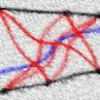 21
21http://www.mathpages.com/home/kmath044/kmath044.htm
 11
11Somewhere I read this, the number of ways that a number n can be represented as a difference of two distinct squares is :
\tex{s(n)} =\frac{1}{2}\left\{d_0(n)+(-1)^{n+1}d_1(n)+\frac{1+(-1)^{d(n)+1}}{2} \right\}
where d(n) denotes the total number of divisors of n, and
d_i(n)=\sum_{d|n, d\equiv i(mod2)}{1}
i \in \left\{0,1 \right\}
Note that the above thing is finite for finite n
Now if a2,b2,c2,d2,.......be an infinite AP,
Common diff=D=b2-a2=d2-c2=......
i.e. D can be represented ad diff. of 2 squares in infinite ways - contradiction.
 21
21just got something that probably is the solution wanted to this problem :)
Let the sequence of natural numbers \left \langle a_n \right \rangle_{n=1}^\infty be such that it's squares are in arithmetic progression. Let \Delta_i = a_{i+1}- a_i , then prove that \Delta_i is a decreasing sequence of natural numbers, which is a contradiction , since no such sequence exists (infinite decent).